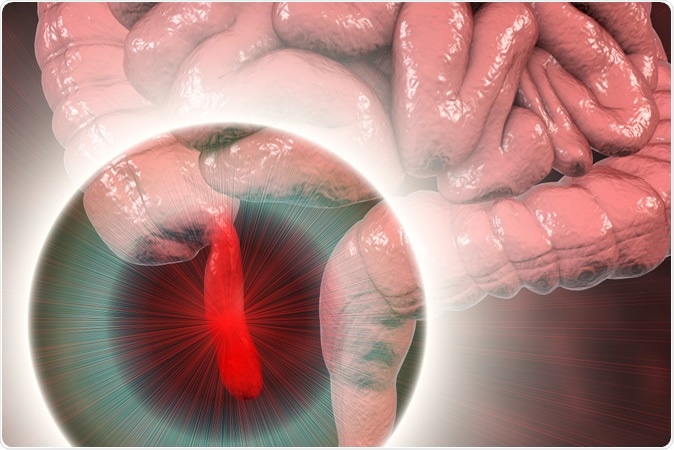
Acute appendicitis, 3D illustration showing inflamed appendix on the cecum. Image Credit: Kateryna Kon / Shutterstock
The inflammation is typically due to a small hard piece of fecal matter, a swollen lymph node, or other reasons for a blocked appendix. This causes the mucus secretions to build up within the small organ, which may eventually burst.
The pain of appendicitis typically begins around the middle of the belly, often fluctuating but worsening over time. In a few hours, in many patients, the pain becomes localized in the lower right-hand part of the abdomen, where the appendix lies. This pain then becomes worse and becomes constant.
When this is suspected, surgery is the usual advice. This has made appendix surgery the most common pediatric emergency surgery. Laparoscopic or keyhole surgery is most commonly advised, but if the appendix is buried deep in the abdomen or has burst, open abdominal surgery will be performed.
The study
The study was carried out by surgeons at the University of Birmingham, who retrieved data on children who were 5 to 13 years old. All had suspected appendicitis. They were drawn from almost 140 hospitals in the UK and the Irish Republic. Both general hospitals and pediatric hospitals were represented from every region to make the study more broadly applicable across the UK.
The findings
The study throws up a disturbing fact – the highest rate of removal of normal appendices in any country is in the UK. This is called normal appendicectomy and refers to the scenario in which the microscopic examination of an appendix removed for suspected appendicitis shows that the organ is healthy.
The study found that surgery is performed in just over a third of children with suspected appendicitis. But in children aged 5-19 years, boys of 11 to 15, and girls of 11 to 15 years, the percentage of ‘normal appendicectomy’ is high, at about 12 percent, 16 percent, and 22 percent.
And this was just a sample. If these figures are extrapolated to the more than 28,000 children who are faced with this diagnosis every year, it would mean that almost 1,600 unnecessary appendicectomies are being done out of the total of almost 10,000.
The problem
The high rate of normal appendicectomy brings two facts into sharp focus: first, that most children who are diagnosed to have appendicitis but don’t have it recover spontaneously, without any treatment. Secondly, having surgery without any real cause can cause a lot of anxiety for both the child and the parents, and the postoperative complications maybe even more distressing.
Researcher Aneel Bhangu points out, “Appendicectomy is the most common emergency operation in children. Our study found that overall the diagnosis is wrong for one in six children who undergo appendicectomy, and a normal appendix is removed. This places an unacceptable burden on both children and their carers.”
The solution
The researchers emphasize the urgent need for an improved protocol to reduce the occurrence of unnecessary surgeries. They would like to see the following steps being set up:
- Routine risk scoring of all children with this diagnosis using the highest-performing risk score for appendicitis, the Shera score. When this is done, most children at low-risk can be sent home earlier, mostly with abdominal pain due to nonspecific causes, and the rest with conditions that can be managed symptomatically.
- All medium and high-risk patients should receive high-quality ultrasound imaging before surgery because this sharply reduces the need for unnecessary surgery, which could reduce the NHS expenditure by £4.4 million every year.
Researcher Dmitri Nepogodiev says the message of the study is that children must get the right diagnosis before the doctor decides to do surgery. In achieving this, a high-quality ultrasound scan is essential. He points out, “Ultrasound scans have the advantage that unlike CAT scans, they do not expose children to radiation. They are a useful diagnostic tool in other countries, but we found that in the UK, ultrasound is frequently inconclusive.
The conclusion is that staff who are well trained in ultrasound imaging to recognize acute appendicitis in children must be available the whole time in hospitals.
Journal reference:
Appendicitis risk prediction models in children presenting with right iliac fossa pain (RIFT study): a prospective, multicentre validation study Nepogodiev, Dmitri et al. The Lancet Child & Adolescent Health, https://www.thelancet.com/journals/lanchi/article/PIIS2352-4642(20)30006-7/fulltext